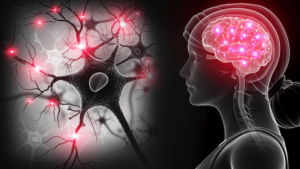“When we learn how to become resilient, we learn how to embrace the beautifully broad spectrum of the human experience.”
― Jaeda Dewalt
Did you know that stress is the cause of eighty-five percent of all diseases? It impacts how we think and behave, relate to one another, and cope well.
Stress, and stress-related illnesses, are among the most prevalent health problems many of us experience. Stress can be described as anything which disturbs the average balance of mental, emotional, and physical equilibrium and wellbeing.
April is National Stress Awareness Month
No doubt we live in a high-stress world. It is a fact and factor in our daily lives affecting people of all ages, including children and especially the elderly.
Stress is a normal human reaction that happens to everyone. When we experience challenges (stressors), the body produces bio-chemical physical and mental responses. Stress becomes a problem when stressors continue without relief or periods of relaxation.
Intelligent Design
The human body is designed to experience stress and react to it. The autonomic nervous system has two complementary but opposing forces working in tandem to support energy flow in the body. The sympathetic (SNS) and parasympathetic systems (PNS) have built-in mechanisms to handle and adapt to acute and episodic stress.
The sympathetic nervous system is also referred to as the catabolic nervous system because when it is active there is increased utilization of many nutrients and hormones. It is important to realize that when the SNS is dominant, the functions of the PNS are proportionately shut down. This is because the body’s resources help the body “fight or flight” in threatening situations.
While most people are not faced with life-threatening conditions (we aren’t running from tigers), our bodies perceive that this is the case. It is triggered when we feel alarmed, emotional, tired, and overworked. One’s stress response is proportionate to the interpretation of the stressor.
The parasympathetic nervous system (PNS), also called the anabolic, or rest, repair, and restore system, is responsible for digestion, elimination, and regulating repair cycles of the body. The PNS also stimulates immune function at night during sleep and its function is closely linked to the timing and release of many key immune hormones and specialized immune messengers.
It’s the body’s wisdom to interpret the stress signals. Worry and mental stress add to the physical stresses and compound the issue because the body cannot differentiate between actual or imagined stress. All stressors can trigger a cascade of glucocorticoid stress hormones that produce well-orchestrated physiological changes.
 Activating the parasympathetic nervous system relaxation response allows the body to conserve energy to be used later. The body is designed to spend much of its time in the anabolic state that the parasympathetic nervous system provides.
Activating the parasympathetic nervous system relaxation response allows the body to conserve energy to be used later. The body is designed to spend much of its time in the anabolic state that the parasympathetic nervous system provides.
Chronic Stress
Some people are especially vulnerable to being in a sympathetic dominant state. When stress overwhelms and becomes chronic, it negatively affects the delicate balance between all body systems.
Sympathetic dominance, the consistent sense of feeling pressured and overwhelmed over a long period of time slowly drains a person’s psychological resources and damages our brains and bodies leading to a lot of secondary conditions or symptoms.
It is crucial to understand that stress culminates no matter what source of stress you experience. If stress persists long enough, the over-production of stress hormones is also likely to lead to Adrenal Fatigue. The adrenal glands are small organs that sit atop each kidney and manufacture your stress hormones and most of your sex hormones. The more stress on top of stress may be the moment when a person breaks.
The physical symptoms of stress include:
- Aches and pains
- Chest pain or a feeling like your heart is racing
- Low energy or exhaustion
- Insomnia or sleepiness
- Headaches, dizziness, or shaking
- High Blood pressure
- Muscle tension or jaw clenching
- Change in appetite: craving sweets or carbohydrates
- Weight gain
- Stomach or digestive problems
- Difficulty having sex
- Chronic inflammation
- Skin issues
- Weak immune system.
Stress can lead to emotional and mental symptoms like:
- Anxiety or panic attacks
- Quick to anger or irritability
- Depression or sadness
- Emotional avoidance and withdrawal
- Confusion, unfocused or cloudy thinking
- Forgetfulness and absentmindedness
- Relational disconnect and isolation.
I’ve noticed that many of my clients repeatedly describe feeling stuck when describing the stress they’re feeling. When life feels out of control and interferes with functioning well, managing stress with habitual self-medication affects our relationships, work productivity, and mental health.
Addressing the symptoms of stress is only one aspect of finding relief and cultivating healthier coping actions. Most importantly, doing whatever possible to remove the sources of stress will empower you to recover faster, so you don’t sweat the small stuff and enjoy a healthier lifestyle.
But life has become more complex, and many situations don’t have easy answers. Maybe you’ve got a lifestyle of overwork, burnout, and exhaustion. Or maybe, you’ve got an undiagnosed medical condition.
Stress sensitivity
Stress sensitivity runs deep in the psyches of many trauma survivors, who often have PTSD – post-traumatic stress disorder. PTSD is a mental health problem that some people develop after experiencing or witnessing a life-threatening event, like combat, a natural disaster, a car accident, or sexual assault.
It’s normal to have upsetting memories, feel on edge, or have trouble sleeping after this type of event. PTSD symptoms may start later for some people or come and go over time. The problem is that they tend to feel stuck in the “on” position, and they can’t let down.
 I also want to bring to your awareness that some people are hard-wired to have a more “excitable” nervous system. They are the ‘sensitives’ that live among us.
I also want to bring to your awareness that some people are hard-wired to have a more “excitable” nervous system. They are the ‘sensitives’ that live among us.
A form of neurodiversity, highly sensitive people have a more finely tuned temperament and are more prone to stress. They are more likely to feel things deeply, whether those things are positive or negative.
Many everyday events on the job or at home will be experienced as stressful by some and exciting, challenging, or even exhilarating by others. Sensitivity to stimuli lowers the threshold of stress and increases reactivity, influencing the intensity of felt emotions, quality of thinking, and behavioral choices.
Enhancing a compassionate understanding of the vulnerability of risk factors associated with stress sensitivity may help to reduce the risk to long-term health. We can teach individuals to anticipate physical and emotional responses and prepare for them so they cope better to stress stimuli.
Adaptive Stress
Not all stress is harmful, though. In fact, our lives are full of physical and psychological challenges that add zest to life and sometimes deliver satisfying rewards. Some people thrive on stress, but only when kept in check.
Adaptive stress can be positive to help us adjust to new situations. It can keep us alert, motivated, and ready to avoid danger. Short-term stress strengthens resilience, so we bounce back from the challenge of daily adversities.
The emotional, mental, and spiritual challenges we face are necessary to our health and growth as human beings. If there were never any stress in our relationships, would we ever learn to communicate with each other effectively? Would we ever learn to understand what we feel, or manage those emotions?
While stress is unavoidable, there are many small ways to help prevent and lessen the impact to keep stress from spiraling. You can do this one thing that is utterly within your control to support yourself:
The next time you notice you feel aroused because of stress, pause and take a few deep breaths, Exhale slowly through pursed lips. Repeat several times, and you will notice that you feel a lot calmer and resourced.
The Healing Power of Flowers
 Since spring has arrived, my neighborhood and surrounding green landscapes are filled with flowers blooming in various colors, shapes, and sizes. Just gazing at the variety of colors soothes me after being at my computer for any length of time.
Since spring has arrived, my neighborhood and surrounding green landscapes are filled with flowers blooming in various colors, shapes, and sizes. Just gazing at the variety of colors soothes me after being at my computer for any length of time.
It has been scientifically proven that aside from delighting the eyes, just being in the presence of flowers in the garden, in the wild, or in your home or office helps us smile and feel better. Flowers have an immediate impact and a positive effect on our moods. It’s hard to feel stressed when we “take the time to smell the flowers!”
The delectable aromas of flowers relax stressed nerves, lower heart rate, and rejuvenate the mood, restoring the body and mind to a state of balanced wholeness.
Embodying Resilience
Positively coping with stress is known as resilience. We know that stress is subjective, and only the person experiencing it can determine whether it’s present or how severe it feels. Stress resilience using flower essence aromatherapy encourages alchemical wellness care for every body.
 Resilience refers to the ability to successfully adapt to stressors and maintain psychological wellbeing in the face of adversity. It’s the ability to “bounce back” from difficult experiences.
Resilience refers to the ability to successfully adapt to stressors and maintain psychological wellbeing in the face of adversity. It’s the ability to “bounce back” from difficult experiences.
Resilience is not necessarily a trait we are born with; we learn how to be resilient by knowing our strengths and weaknesses and incorporating mindfulness strategies to rebalance ourselves.
Developing effective coping skills to manage stress means permitting yourself to relax. How often have you said, “I don’t have time.” No matter what you’re managing, when you don’t put yourself first, you’ll run ragged trying to keep up. Prioritizing your wellness care is something you can do to increase your self-worth too.
It is important to normalize your stress levels and learn from your body wisdom what normal cortisol levels feel like by giving yourself protected time to let down. The positive effects on your hormones can improve sound quality sleep, reduce weight, improve your ability to cope, be more resilient, have a more balanced outlook, get less angry or irritable, and concentrate better.
Flower Essence Aromatherapy Tools
Besides being a cornerstone for alchemical wellness care, one of the most valuable tools that I use for helping me to manage temporary symptoms of stress is flower essence aromatherapy.
Flower essences help clear the buildup of stress in the subtle body, especially when you feel stuck. They are honored helpers who open our awareness of ourselves, so we take responsibility for creating our own experience with loving detachment. Emotionally, they help us release submerged feelings and negative emotions.
 Aromatherapy has been well documented for its stress-relieving properties. There is a vast array of essential oils that relax and calm the nervous system, strengthen the adrenals, uplift mood, and help us to think clearly.
Aromatherapy has been well documented for its stress-relieving properties. There is a vast array of essential oils that relax and calm the nervous system, strengthen the adrenals, uplift mood, and help us to think clearly.
All the sedative and antidepressant oils help to relax the body and mind. Some of these oils include Bergamot, Chamomile, Citrus, Clary Sage, Frankincense, Jasmine, Lavender, Lemongrass, Marjoram, Neroli, Rose, Sandalwood, Vanilla, Vetiver, and Ylang-ylang. Essential oils that help strengthen the action of the adrenal glands help in the short term. The most useful of these oils are Geranium, Peppermint, and Rosemary, but they should not be overused.
Many Fleur Sprays and Body Oils are formulated to help reduce the debilitating effects of stress and its symptoms. Our customers report that misting Anxiety Relief Spray, Hope Spray, or Release Spray quickly lowers their stress threshold.
Our products’ ethically sourced organic essential oils are alchemically blended into a carrier oil to benefit their therapeutic properties through transdermal penetration. With the power of smell and touch, flower essence aromatherapy can activate the parasympathetic nervous system and calm an overactive sympathetic state reducing symptoms of stress.
Praśānta Calming Body Oil was formulated with the nervous system in mind. It gently helps the autonomic system let down. The relaxing scent of lavender and the bright aroma of sweet orange calms run away stress, benefiting people of all ages, including children and their parents. Use it on your touchpoints or with a massage.
 Lifestyle Modifications
Lifestyle Modifications
Other ways to keep the sympathetic nervous system from becoming overactive or excessive include lifestyle modifications.
Finding ways of creative expression may help discharge stuck energy to help you reframe the way you think about yourself or your problems.
The practice of deep diaphragmatic breathing, self-compassion, walking barefoot on the earth, meditation, yoga, Tai Chi, diet, massage, and mild to moderate exercise can help keep stress in check.
Lastly, sleep is the number one activity to recover from stress – and it’s free! I can’t emphasize this enough. How much energy you accumulate determines how much energy you can express outwardly. Your body’s ability to recover and repair itself is tied in very real, biological ways to the sleep that you get every night.
If you’re unsure if stress is to blame for feeling out of sorts, or you’ve tried to control your stress, but your symptoms persist, you should contact your physician or a qualified health professional to discuss your situation. Or consider seeing a professional counselor or therapist who can help you identify sources of your stress and learn new coping tools.
Flower essence aromatherapy is a self-care tool to help you manage symptoms of stress before your symptoms become engrained. Becoming resilient to the negative aspects of stress will help you restore wholeness, so you feel better, sleep better, look better, and smile more often.
All my aromatic love,
Vidya

